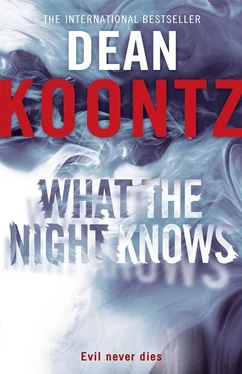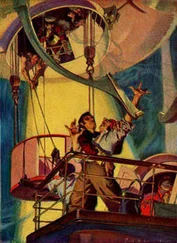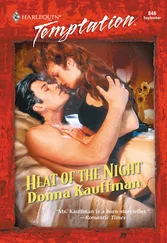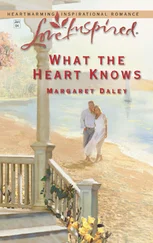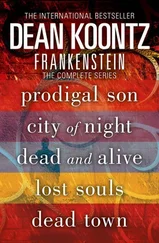To accommodate Sandra Lucas in her wheelchair, the porch offered both steps and a ramp.
He took off his raincoat, shook it, and folded it over his left arm because the only other place to put it was a glider with stained yellow cushions. After Billy finished with his sister and called 911, he had come to the front porch and had sat on the glider, naked and drenched in blood.
In most jurisdictions, after attaining the age of fourteen, children are presumed to have sufficient capacity to form criminal intent. Neither moral nor emotional insanity – as distinguished from mental – exempts the perpetrator from responsibility for his crimes.
To the first two police officers on the scene, Billy offered his sister for ten dollars each and told them where she could be found. “Just leave twenty bucks on the nightstand,” he said. “And don’t have a cigarette after. This house is a no-smoking zone.”
Now the police-department seal had been peeled off the front door. Two days previously, long after the criminalists collected trace evidence and prints, after a review of that evidence supported Billy’s confession in every detail, after the boy was evaluated by psychiatrists, and after he was remanded to the state hospital under a preliminary finding of insanity to be reaffirmed or reconsidered in sixty days, the house ceased to be an active crime scene.
No one from the department would have come by merely to remove the seals from the exterior doors. Because the Lucases had no family nearby, perhaps an attorney, serving as executor, had been here to review the condition of the house.
John used the key with the dangling cat charm. He went inside, closed the door, and stood in the foyer, listening to this home that had become a slaughterhouse.
He possessed no authority to enter these premises. Technically, the case file remained open until Billy could be evaluated in sixty days, but the investigation was inactive. Anyway, this had never been John’s assignment.
If he’d been unable to discover a neighbor with a key, his only alternative would have been to force entry. He would have done it.
With his back against the front door, he sensed that someone waited for him in one of the surrounding rooms, but this was a false perception. In other murder houses, after the bodies were removed and the evidence collected, when he returned alone to consider the scene in solitude, he usually experienced this disturbing impression of a presence looming, but it always proved to be unfounded.
Chapter 6
Thunder no longer roared, and the rain subsided from drumming torrents to a drizzle too soft to press a whisper through the walls.
According to the real-estate records at the county assessor’s office, the residence had six main rooms on the ground floor, five on the upper level. As John stood in the dusky foyer, the house felt larger than described. The hollow silence had a quality of vastness, as of caverns coiling countless miles through deep strata of stone.
Eight-pane sidelights flanked the front door, but the mummified sun, enwrapped by sodden clouds, would soon be setting.
He waited for his eyes to adjust to the gloom. He intended to turn on as few lights as possible.
Sometimes the visible aftermath of violence so disturbed him that he couldn’t properly work the scene. One gang thug capping another in a territorial dispute never fazed him. An investigation involving a murdered family brought him to the brink.
He wasn’t here in an official capacity. This was personal. Therefore, shadows wouldn’t hamper him. Shadows soothed.
Compassion and pity were desirable in a homicide detective. In some cases, however, a capacity for intense empathy tended to depress and to discourage rather than to motivate.
In spite of his sometimes anguished identification with victims, John could have been nothing but what he was. He became a detective not because he thought the job glamorous or because the benefits were generous. He felt compelled to follow that path. His career became a necessity; no alternative existed either in thought or in fact.
Ahead, on the left, a gray glow might have defined an archway to a living room. Above, a window on the stairwell landing admitted just enough daylight to suggest a handrail, balusters.
Soon his dark-adapted eyes identified the newel post at the foot of the stairs. He draped his raincoat over it.
From an inner sport-coat pocket, he produced a compact LED flashlight, but he did not at once switch it on.
He wasn’t seeking nuances of crime-scene conditions critical to a prosecution. The premises had been well-tramped; what evidence once existed had been gathered or contaminated, or obliterated.
What he sought was more ephemeral this time, more elusive: a keener intuition than the one on which he currently operated, some insight, some revelation, an enlightenment that would either confirm or put to rest his hunch that the Lucas family would be only the first of four to be massacred.
John followed the dark hall to the kitchen, where the door and casing had been removed to accommodate a wheelchair. The windows were curtained with translucent fabric that filtered the dismal light.
A rancid smell halted him one step past the threshold.
The flashlight fanned a wheelchair near the breakfast bar, the chair in which Billy’s mother died when he slammed the knife through her throat.
Now on the floor in front of the fridge, the LED beam revealed the source of the odor. A quart of spilled milk marbled with the mother’s blood had congealed into a yellow-and-purple scum peppered with patches of mold. The mess glistened, still not entirely dry.
According to Billy’s confession, his mother tried to scream but couldn’t raise more than a rasp-and-rattle, a whistling wheeze. She could not summon the help of other family members – or warn them.
As if those sounds had been recorded on the walls, John heard them, imagined in his mind’s ear but as real to him as the thunder earlier and as his wife’s voice would be when he went home to her.
Sandra Lucas had been disabled in a traffic accident. She coped elegantly with her new circumstances but also volunteered to counsel others in her condition. She gave motivational speeches stressing the importance of family, the strength a spouse could provide, and the reward of being an example of grace and courage for your children.
She bled to death, but drowned, too, from aspirated blood.
The radiant green numerals in the digital clock on the oven had displayed the correct time. Now, inexplicably, the numerals began to flash midnight or noon.
Maybe the electrical service failed for a moment, requiring that the clock be reset. Because he had not switched on any house lights, he wouldn’t have been aware of a brief power outage.
He watched the numbers flashing. He watched them and wondered.
The rancid odor seemed to intensify.
After backing away from the odor but not all the way out of the past into the present, John went next to the study. Here, Robert Lucas had been bludgeoned with a hammer while paying bills.
Robert’s desk was along the far wall, facing a window, so that he could look up from his work to enjoy a view of the three paper birches in the yard. This put his back to the study door.
Darkness shrank from the flashlight beam, and a collage appeared on top of the desk: an artful scattering of envelopes, invoices, and a sheet of postage stamps against a desk-blotter background, all of it unevenly glazed with a lacquer once bright red, now red-black and rust and purple.
In his audio imaginarium, John Calvino heard nothing of Robert’s death cries, perhaps because the first blow had rendered the man unconscious before a sound could escape him.
The flashlight found a spattered pen set on a white marble base, a sprayed windowsill, spotted draperies. The spatter, the spray, and the spotting comprised a kind of scream, a shrill shriek that seemed to arise in John’s bones, but this was not a sound that had been made by the victim; this was his own unvoiced cry of moral revulsion.
Читать дальше
